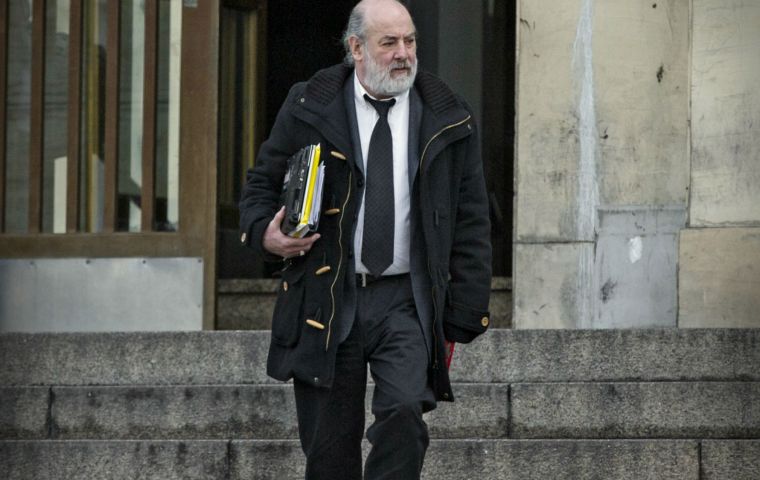MercoPress. South Atlantic News Agency
The Argentine judge who prosecuted vice president Cristina Fernandez de Kirchner is dead
 He was the first judge to call CFK on investigation and was the one who most times prosecuted and raised her to oral and public trial.
He was the first judge to call CFK on investigation and was the one who most times prosecuted and raised her to oral and public trial. Argentine federal judge Claudio Bonadio, notorious for bringing cases involving the former president and current vice president Cristina Fernández de Kirchner (CFK), died Tuesday morning at his home it was reported.
The magistrate was on sick leave since 2019 after undergoing surgery for a brain tumor in May. His death occurs just 4 days after his 64th birthday.
“Until December he was working and he was fine,” his secretary told on local television.
Bonadio was in charge of Federal Criminal and Correctional Court No. 11 since 1994. He was the first judge to call CFK on investigation in the case known as “future dollar”, in addition to being the one who most times prosecuted and raised her to oral and public trial.
His fame was based on high profile cases, although he was also one of the federal magistrates with more complaints and accusations against him.
The Corruption Notebooks, Hotesur, Los Sauces, future dollar and the complaint of Prosecutor Alberto Nisman, were some of the causes that Bonadio instructed in his 26 years of career as a federal judge.
In 2014, CFK accused Bonadio of having a stake in a company that did not submit the statements in due time. In February 2016, by a complaint by deputies of the CFK's Front for Victory, it was investigated whether there was “a systematic behavior tending to benefit those who had made an important purchase of future dollar in the prevention that if the government was accessed with a mega devaluation a great business was done.” The complainants affirmed that Bonadio committed “prevaricate, when issuing resolutions contrary to the law and based on false facts” and incurred “attempted procedural fraud and illegal deprivation of freedom by altering the factual basis of the cause for the purpose to give support to precautionary measures restricting freedom.”
Bonadio also made headlines in 2001 when he drew a gun and killed two alleged assailants in a confusing episode.
Last September, Bonadio brought CFK and its Planning Minister and later national Deputy Julio De Vido to trial.
For his part, Graciana Peñafort, a lawyer for CFK and former Vice President Amado Boudou, extended her “condolences to the family,” but added that “I hope that God's justice is more merciful than Bonadío was in his lifetime. nothing more”, because “I don't know any case where he worked well.”
Former Cabinet Chief Aníbal Fernádez said in a radio interview that “I don't think justice remembers it well,” although he said he felt “dismayed”, since “he was once a friend.”
Bonadio had started his political career in 1992 as an advisor to the then Menemist official Carlos Corach. His name had appeared on the famous “Corach napkin”, which featured the judges who “played in favor of the Government” of former president Carlos Menem.
In 1996, former minister Domingo Cavallo said he saw and heard how Corach asked Bonadio to file a cause for alleged illicit enrichment.
Among the causes that he carried out during the Menem government is the AMIA case on the attack on the Jewish mutual; the PAMI case where his then controller, Víctor Alderete, was accused of corruption and the case of irregular loans obtained by the Yoma Tannery, linked to the family of Menem's ex-wife.
During the 90s he was denounced for ”fueling” cases against officials and friends of people in positions of power. He was repeatedly sanctioned for not allowing defendants and their lawyers to access their files or for arbitrariness.




Top Comments
Disclaimer & comment rules-

-

Read all commentsI wondered if it was going to say it was suicide.. bet CFK is celebrating now.
Feb 04th, 2020 - 10:04 pm 0And WTF is this mess?
“a systematic conduct tending to benefit those who had made an important purchase of the future dollar in the prevention that if the government was accessed with a mega devaluation It was a business penguin.”
The last para in the above story pretty much defines Dr. Glock:
Feb 08th, 2020 - 12:46 am 0“He was repeatedly sanctioned for not allowing defendants and their lawyers to access their files or for arbitrariness.”
Bonadio was, indeed, a one-of-a-kind sort of judge, working according to his own rules.
In federal court hallways, his office was called “the embassy” because the Argentine law did not apply there.
Now many wonder what will be found on Bonadio's active files once another judge begins to work on them.
Commenting for this story is now closed.
If you have a Facebook account, become a fan and comment on our Facebook Page!